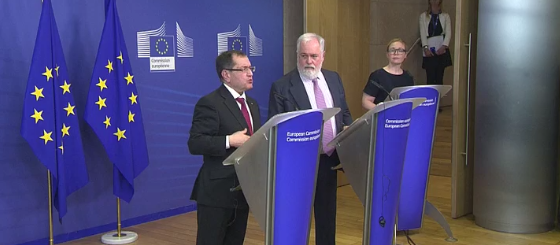Algeria Ready to Improve Tax Terms: Boutarfa
Algeria is not planning to revise its hydrocarbons law but is looking to adjust fiscal terms to boost exploration and remains in talks on this with upstream firms, explained its energy minister Noureddine Boutarfa April 11, referring to how a related legal dispute with Total was recently resolved.
The minister was in Brussels for talks with EU energy and climate change commissioner Miguel Arias Canete who stressed the EU’s strong gas trade links, saying that Algerian 2016 gas exports to the EU were 54bn m³, with Spanish gas dependence on Algerian imports at 55%, Italy’s at 16% and France’s at 15%. But he also said that investors’ concerns need to be addressed.
An EU-Algeria business forum, focused on upstream gas, will be held in late 2017 (a similar forum having been held in Algiers last May), with a specific forum to be held this May 2017 for potential investors in Algeria’s 4-GW renewable energy tender, the commissioner added.
Boutarfa said he had told his EU counterpart that Algeria would have “no problems... over the next few years” in maintaining its current gas market position in Europe, and that it was fine if buyers wish to negotiate Algerian gas contracts merely on a short-term basis.

Algerian energy minister Boutarfa (left) with EU commissioner Arias Canete (centre) at April 11 2017 briefing (Photo credit: European Commission)
“We want Europe to be even more present in Algeria’s economic diversification, especially in gas,” said Boutarfa at a press briefing after his meeting, noting that Europe in particular could help the north African country with investments in new sectors such as shale gas and renewable energy. The government in Algiers wants its people to have access to renewable energy, he added.
G7 nations agreed on the need to step up investment in Africa's renewable energy at a meeting April 9, prior to the main G7 energy meeting a day later.
European investment in shale might even reassure the Algerian population, argued Boutarfa. That however is in doubt since Sonatrach suspended exploratory drilling for shale gas in 2015 after protest rallies in the In Salah area.
But there have been positive developments in conventional oil and gas: just over a month ago, Eni and ExxonMobil agreed to conduct joint exploration offshore Algeria, while US firm Anadarko said in December it wanted to expand its Algerian investment. Total this week recommitted to invest too.
Upstream there is a “permanent three-way dialogue about security" involving Algeria’s security services, local businesses and investor partners, said Boutarfa. Security was a common interest with Europe, and not particular to Algeria. But he acknowledged the January 2013 attack by Islamists on the BP-run In Amenas gas production complex, in which 40 workers were killed. Since then all 3 units at In Amenas had been restarted and that other projects are advancing, he said.
Mark Smedley



